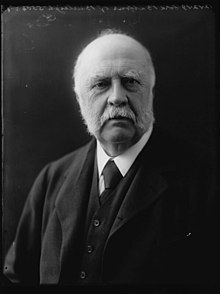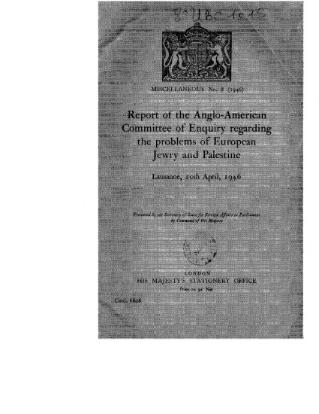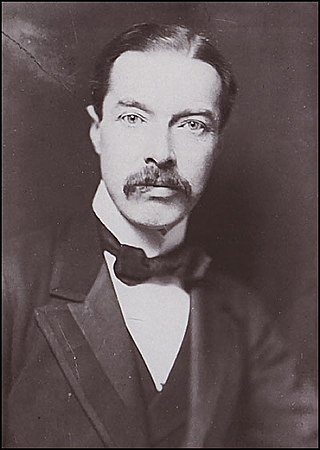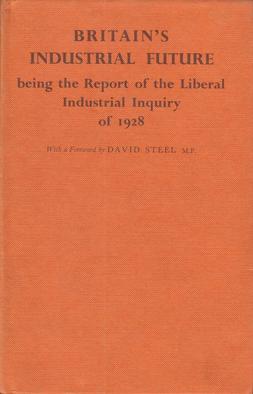
The Committee on Commercial and Industrial Policy was a British First World War government committee chaired by Lord Balfour of Burleigh from 1916 to 1918. It was appointed to devise recommendations for Britain's postwar economic policies.

The Committee on Commercial and Industrial Policy was a British First World War government committee chaired by Lord Balfour of Burleigh from 1916 to 1918. It was appointed to devise recommendations for Britain's postwar economic policies.
The Paris Economic Conference of the Allied Powers had resolved to damage the Central Powers economically. [1] The Prime Minister, H. H. Asquith, appointed the Committee in July 1916 in order to implement the Paris Resolutions. [1]
The committee included W. A. S. Hewins (Conservative), Lord Faringdon (Conservative), Alfred Mond (Liberal), Lord Rhondda (Liberal), J. A. Pease (Liberal), George Wardle (Labour), Sir Henry Birchenough and Richard Hazleton (Irish Nationalist). [1] [2]
The experience of the war had challenged laissez-faire economic beliefs: at its first meeting (on 25 July 1916) Balfour instructed its members to "cast aside any abstract fiscal dogmas". [3]
The committee's interim report on certain essential industries argued for a Special Industries Board to scrutinize industrial development and promote the manufacture of strategically essential products. This Board should offer state support for efficient businesses but "failing efficient and adequate output, the Government should itself undertake the manufacture of such articles as may be essential for national safety". [4]
Two interim reports appeared in April and May 1918: the "Interim Report on the Importation of Goods from the Present Enemy Countries after the War" and the "Interim Report on the Treatment of Exports from the United Kingdom and British Overseas Possessions and the Conservation of the Resources of the Empire during the Transitional Period after the War". [5] These recommended that British industries should be protected from dumping after the war; that the enemy's economic domination should be countered; and that key industries should be protected. [5] In return for being protected, industry would be obliged to accept the state's conditions for support: cooperation between employer and employees was recommended, as was profit sharing and state control over industrial combinations. [5]
The committee's final report dealt with the future of British industry both in commercial competitiveness and capacity for war:
It is in our opinion a matter of vital importance that, alike in the old-established industries and in the new branches of manufacture which have arisen during the war, both employer and employed should make every effort to attain the largest possible volume of production, by the increased efficiency of industrial organisation and processes, by more intensive working, and by the adoption of the best and most economical methods of distribution.
[And] it is only by the attainment of this maximum production and efficiency that we can hope to secure a speedy recovery of the industrial and financial position of the United Kingdom and assure its economic stability and progress. [6]
The report also recommended: "The individualist methods hitherto mainly adopted should be supplemented or entirely replaced by co-operation and co-ordination". [7]

Richard Burdon Haldane, 1st Viscount Haldane, was a lawyer and philosopher and an influential British Liberal and later Labour politician. He was Secretary of State for War between 1905 and 1912 during which time the "Haldane Reforms" of the British Army were implemented. As an intellectual he was fascinated with German thought. That led to his role in seeking detente with Germany in 1912 in the Haldane Mission. The mission was a failure and tensions with Berlin forced London to work more closely with Paris.

Herbert Louis Samuel, 1st Viscount Samuel was a British Liberal politician who was the party leader from 1931 to 1935.
The Minister of Munitions was a British government position created during the First World War to oversee and co-ordinate the production and distribution of munitions for the war effort. The position was created in response to the Shell Crisis of 1915 when there was much newspaper criticism of the shortage of artillery shells and fear of sabotage. The Ministry was created by the Munitions of War Act 1915 passed on 2 July 1915 to safeguard the supply of artillery munitions. Under the very vigorous leadership of Liberal party politician David Lloyd George, the Ministry in its first year set up a system that dealt with labour disputes and fully mobilized Britain's capacity for a massive increase in the production of munitions.

The United Kingdom was a leading Allied Power during the First World War of 1914–1918. They fought against the Central Powers, mainly Germany. The armed forces were greatly expanded and reorganised—the war marked the founding of the Royal Air Force. The highly controversial introduction, in January 1916, of conscription for the first time in British history followed the raising of one of the largest all-volunteer armies in history, known as Kitchener's Army, of more than 2,000,000 men. The outbreak of war was a socially unifying event. Enthusiasm was widespread in 1914, and was similar to that across Europe.
Correlli Douglas Barnett was an English military historian, who also wrote works of economic history, particularly on the United Kingdom's post-war deindustrialization.

The Interim Committee was a secret high-level group created in May 1945 by United States Secretary of War, Henry L. Stimson at the urging of leaders of the Manhattan Project and with the approval of President Harry S. Truman to advise on matters pertaining to nuclear energy. Composed of prominent political, scientific and industrial figures, the Interim Committee had broad terms of reference which included advising the President on wartime controls and the release of information, and making recommendations on post-war controls and policies related to nuclear energy, including legislation. Its first duty was to advise on the manner in which nuclear weapons should be employed against Japan. Later, it advised on legislation for the control and regulation of nuclear energy. It was named "Interim" in anticipation of a permanent body that would later replace it after the war, where the development of nuclear technology would be placed firmly under civilian control. The Atomic Energy Commission was enacted in 1946 to serve this function.

The Anglo-American Committee of Inquiry was a joint British and American committee assembled in Washington, D.C., on 4 January 1946. The committee was tasked to examine political, economic and social conditions in Mandatory Palestine and the well-being of the peoples now living there; to consult representatives of Arabs and Jews, and to make other recommendations 'as may be necessary' to for ad interim handling of these problems as well as for their permanent solution. The report, entitled "Report of the Anglo-American Committee of Enquiry Regarding the Problems of European Jewry and Palestine", was published in Lausanne, Switzerland on 20 April 1946.

Sir Eyre Alexander Barby Wichart Crowe was a British diplomat, an expert on Germany in the Foreign and Commonwealth Office. He is best known for his vehement warning, in 1907, that Germany's expansionism was motivated by animosity towards Britain and should provoke a closer Entente Cordiale between the British Empire and France.
The Ten Year Rule was a British government guideline, first adopted in August 1919, that the armed forces should draft their estimates "on the assumption that the British Empire would not be engaged in any great war during the next ten years".
The Esher Report of 1904, issued by a committee chaired by Lord Esher, recommended radical reform of the British Army, such as the creation of an Army Council, General Staff and Chief of the General Staff and the abolition of the Commander-in-Chief of the Forces.

The Climate Change Committee (CCC), originally named the Committee on Climate Change, is an independent non-departmental public body, formed under the Climate Change Act (2008) to advise the United Kingdom and devolved Governments and Parliaments on tackling and preparing for climate change. The Committee provides advice on setting carbon budgets, and reports regularly to the Parliaments and Assemblies on the progress made in reducing greenhouse gas emissions. Notably, in 2019 the CCC recommended the adoption of a target of net zero greenhouse gas emissions by the United Kingdom by 2050. On 27 June 2019 the British Parliament amended the Climate Change Act (2008) to include a commitment to net zero emissions by 2050. The CCC also advises and comments on the UK's progress on climate change adaptation through updates to Parliament.

Sir John Henry Birchenough, 1st Baronet, was an English businessman and public servant.

The Beveridge Report, officially entitled Social Insurance and Allied Services, is a government report, published in November 1942, influential in the founding of the welfare state in the United Kingdom. It was drafted by the Liberal economist William Beveridge – with research and publicity by his wife, mathematician Janet Philip – who proposed widespread reforms to the system of social welfare to address what he identified as "five giants on the road of reconstruction": "Want… Disease, Ignorance, Squalor and Idleness". Published in the midst of World War II, the report promised rewards for everyone's sacrifices. Overwhelmingly popular with the public, it formed the basis for the post-war reforms known as the welfare state, which include the expansion of National Insurance and the creation of the National Health Service.

Sir William Pearce was an English chemical manufacturer and Liberal Party politician in the East End of London, in England. He was Member of Parliament (MP) for Limehouse constituency from 1906 to 1922. He played cricket as an amateur for Kent County Cricket Club and Essex County Cricket Club in his 20s, making three first-class appearances, all of them for Kent.
The Macmillan Committee, officially known as the Committee on Finance and Industry, was a committee, composed mostly of economists, formed by the British Labour government after the 1929 stock market crash to determine the root causes of the depressed economy of the United Kingdom. The Macmillan Committee was formed in 1929 by Royal Command 3897, and it was tasked with determining whether the contemporary banking and financial system was helping or hindering British trade and industry. Scottish lawyer Hugh Pattison Macmillan was named as its chairman, although due to his lack of economic or financial expertise, he largely "remained in the background". Other members of the committee included Ernest Bevin, Lord Bradbury, R. H. Brand, Theodore Gregory, John Maynard Keynes, and Reginald McKenna.
John O'Neill was an Irish businessman who was an Irish Free State senator in 1925. He was formally independent, but took a pro-Cumann na nGaedheal line. In 1925 he was living in Delgany, County Wicklow, and described himself as a "cycle manufacturer and motor trader". He owned O'Neill Motors, a Dublin garage acquired in 1959 by Ryan's Car Hire.
The 1929 Liverpool East Toxteth by-election was a parliamentary by-election for the British House of Commons constituency of Liverpool East Toxteth on 19 March 1929.
The great depression of British agriculture occurred during the late nineteenth century and is usually dated from 1873 to 1896. Contemporaneous with the global Long Depression, Britain's agricultural depression was caused by the dramatic fall in grain prices that followed the opening up of the American prairies to cultivation in the 1870s and the advent of cheap transportation with the rise of steamships. British agriculture did not recover from this depression until after the Second World War. Other countries in Western Europe such as the Netherlands experienced the same agricultural crisis (1878–1895) as a result of the market being flooded by cheap grain from the United States and Canada.

Britain's Industrial Future, commonly known as the Yellow Book, was the report of the British Liberal Party's Industrial Inquiry of 1928.
The Royal Commission on Technical Instruction was a British Royal Commission that sat from 1881 until 1884 and was chaired by Sir Bernhard Samuelson.